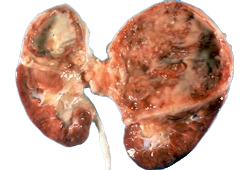Summary
Definition
History and exam
Key diagnostic factors
- flank pain
- costovertebral angle tenderness
- fever
- new or different myalgia, or flu-like symptoms
- presence of risk factors
- nausea
- vomiting
Risk factors
- urinary tract infection
- diabetes mellitus
- stress incontinence
- foreign body in urinary tract (e.g., calculus, catheter)
- anatomical/functional urinary abnormality
- immunosuppressive state (e.g., HIV, transplantation, chemotherapy, corticosteroid use)
- pregnancy
- frequent sexual intercourse
- mother with urinary tract infection history
- new sex partner
- spermicide use
- age between 18 and 50 years
- age >60 years
Diagnostic investigations
1st investigations to order
- urinalysis
- urine culture and sensitivity
- full blood count
- erythrocyte sedimentation rate
- C-reactive protein
- urea and electrolytes
- creatinine
- blood culture (in hospital)
Treatment algorithm
Contributors
Expert advisers
Andrew Lewington, BSc (Hons), MBBS, MEd, MD, FRCP
Consultant Renal Physician
Honorary Associate Professor
Nephrology Department
Leeds Teaching Hospitals NHS Trust
Head of MBChB
School of Medicine
University of Leeds
Leeds
UK
Disclosures
AL has been the principal applicant/co-applicant for a number of grants including: Engineering and Physical Sciences Research Council Research - Multiplexed AKI biomarker detection with a single molecule biosensor; Leeds Cares - A novel, non-invasive diagnostic approach to assess kidney transplant health through the targeted measurement of biomarkers of kidney injury and immune response in kidney transplant recipients at the Leeds Teaching Hospitals NHS Trust; Kidney Research Yorkshire - Use of enhanced technology to characterise haemodialysis treatment for acute kidney injury (AKI); Bringing It Home - Validation of a micro-sampling technique for measuring tacrolimus and creatinine remotely; and to fund a research nurse; British Renal Society - Renal function assessment with point of care creatinine in diverse populations (RAPID), and several NIHR grants including on a) Improving the quality of post-discharge care following AKI b) An investigation into the use of remote blood sample collection to reduce health inequalities in patients with mental health disorders c) A comparison of remote blood collection devices: a human factor use study d) Defining the characteristics for a novel automatic device to monitor urine output in catheterized patients e) Leeds Medtech and In-vitro Diagnostic Cooperative Grant Extension f) Surgical MedTech Co-operative for the 2019/20 proof-of-principle funding stream g) A pilot investigation into the use of beta-trace protein for residual renal function estimation in haemodialysis h) Application of functional MRI to improve assessment of chronic kidney disease (AFiRM study) i) SuperResPath-Renal: Quantitative super-resolution technology for a fast, decentralised clinical diagnosis of renal pathologies. AL is the co-author of a number of manuscripts including on extracorporeal treatments, AKI, kidney function testing prior to contrast-enhanced CT, plasma exchange and glucocorticoids in severe ANCA-associated vasculitis, COVID-19 rapid diagnostics, multimodal image-guided ablation on management of renal cancer in Von-Hippel-Lindau syndrome, and on a summary of NICE guidance on CKD. AL is the author of several book chapters on nephrology and AKI. AL has received expenses for accommodation and travel for conferences at which he has given lectures, other than those delivered virtually. AL was a member of the AKI Scientific Program Committee for the ISN World Congress of Nephrology 2020-2021 and Chair of this same committee in 2021-2022.
Acknowledgements
BMJ Best Practice would like to gratefully acknowledge the previous expert contributor, whose work has been retained in parts of the content:
Lynda A. Frassetto, MD
Professor of Medicine
Division of Nephrology
University of California
San Francisco
CA
LAF declares that she has no competing interests.
Peer reviewers
Shruti Goel, MBBS, FRCP
Consultant Nephrologist
The Hillingdon Hospital NHS Foundation Trust
London
UK
Disclosures
SG declares that she has no competing interests.
Use of this content is subject to our disclaimer
